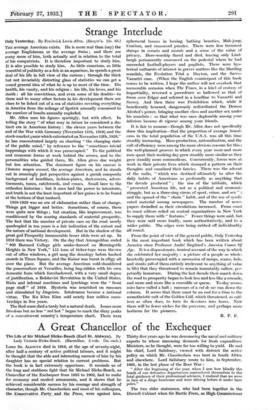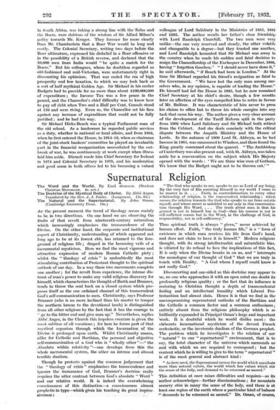A Great Chancello r of the Exchequer
Loan ST. ALDWYN died in 1918, at the age of seventy-eight, after half a century of active political labours, and it might be thought that the able and interesting memoir of him by his daughter has no special relation to current problems. But the book is in fact extremely opportune. It reminds us of the long and stubborn fight that Sir Michael Hicks-Beach, as Chancellor of the Exchequer from 1895 to 1902, had to make for economy and modest armaments, and it shows that he achieved considerable success by his courage and strength of character, though Mr. Chamberlain and most of his colleagues, the Conservative Party and the Press, were against him.
Thirty-five years ago he was denouncing the naval and military experts to whose unceasing demands for fresh expenditure Ministers, as he thought, were far too willing to yield. He and his chief, Lord Salisbury, viewed with distrust the active policy on which Mr. Chamberlain was bent in South Africa and elsewhere. Lord Salisbury wrote to him, in September, 1901, in the last phase of the Boer War :
"After the beginning of the year, when I saw how blindly the heads of our defensive departments surrendered themselves to the fatal guidance of their professional advisers, I realised that we were in face of a Jingo hurricane and were driving before it under bare poles."
The two elder statesmen, who had been together in the Disraeli Cabinet when Sir Bartle Frere, as High Commissioner in South Africa, was taking a strong line with the-Zulus and the Boers, were dubious of the wisdom of Sir Alfred Mihier's policy towards Mr. Kruger. They foresaw far more clearly than Mr. Chamberlain that a Boer War would be long and costly. The Colonial Secretary, writing two days before the Boer ultimatum, expressed his disbelief in a Boer offensive or in the possibility of a British reverse, and declared that the 10,000 men from India would " be quite a match for the Boers." But his colleagues, whom he doubtless regarded as old-fashioned and mid-Victorian, were unfortunately right in discounting his optimism. That war ended the era of high prosperity and low taxation, to which we may look back as a sort of half mythical Golden Age. Sir Michael in his earlier Budgets had to provide for no more than about £100,000,000 of expenditure ; the Income Tax was a few pence in the pound, and the Chancellor's chief difficulty was to know how to pay off debt when Two and a Half per Cent. Consols stood at 110 and were rising. Even so, the Chancellor set his face against any increase of expenditure that could not be fully justified ; and he had his way.
Sir Michael Hicks-Beach was a typical Parliament man of the old school. As a landowner he regarded public services as a duty, whether in national or local affairs, and from 1864, when he first entered the House, to 1914-16, when as chairman of the joint-stock bankers' committee he played an invaluable Fart in the financial reorganization necessitated by the out-. break of war, he was continuously at work except when illness laid him aside. Disraeli made him Chief Secretary for Ireland in 1874 and Colonial Secretary in 1878, and his moderation and good sense in both offices led to his becoming a valued colleague of Lord Salisbury in the Ministries of 1885, 1888 and 1895. The author recalls her father's close friendship with Lord Randolph Churchill. The two men were very unlike—the one very reserved and steady, the other volatile and changeable to a degree—but they trusted one another, and Lord Randolph lamented that Sir Michael was away in the country when he made his sudden and fatal decision to resign the Chancellorship of the Exchequer in December, 1886, having " forgotten Gosehen." " I should never have done it," he said afterwards, " if Beach had been in London." At the time Sir Michael regarded his friend's resignation as fatal to the Government. " We have lost the only man among our- selves who, in my opinion, is capable of leading the House." He himself had led the House in 1885, but he now remained Chief Secretary at his chief's desire, though a few months later an affection of the eyes compelled him to retire in favour of Mr. Balfour. It was characteristic of him never to press his claims to office but to throw his whole energies into any task that came his way. The author gives a very clear account of the development of the Tariff Reform split in the party from 1902 when Lord Salisbury and Sir Michael both retired from the Cabinet. And she deals concisely with the critical dispute between the Asquith Ministry and the House of Lords. In the autumn of 1909 Lord St. Aldwyn, as he had become in 1905, was summoned to Windsor, and there found the King greatly concerned about the quarrel. " The Archbishop of Canterbury was also present and, with St. Aldwyn, was taken aside for a conversation on the subject which His Majesty opened with the words : ' We are three wise men of Gotham. We know that the Budget ought not to be thrown out.' "



































 Previous page
Previous page